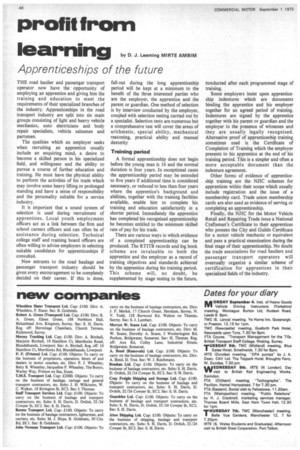profit from
Page 52

If you've noticed an error in this article please click here to report it so we can fix it.
learning by D. J. Leeming MIRTE AMBIM
Apprenticeships of the future
THE road haulier and passenger transport operator now have the opportunity of employing an apprentice and giving him the training and education to meet the requirements of their specialized branches of the industry. Apprenticeships in the road transport industry are split into six main groups consisting of light and heavy vehicle mechanics, auto electricians and body repair specialists, vehicle salesmen and part smen.
The qualities which an employer seeks when recruiting an apprentice usually include an enquiring mind, a desire to become a skilled person in his specialized field, and willingness and the ability to pursue a course of further education and training. He must have the physical ability to perform the activities of his trade which 'nay involve some heavy lifting or prolonged standing and have a sense of responsibility and the personality suitable for a service industry.
It is important that a sound system of selection is used during recruitment of apprentices. Local youth employment officers act as a link between the firm and school careers officers and can often be of assistance during selection. Technical college staff and training board officers are often willing to advise employers in selecting suitable candidates for apprenticeships if consulted.
New entrants to the road haulage and passenger transport industry should be given every encouragement to be completely decided on their career. If this is done, fall-out during the long apprenticeship period will be kept at a minimum to the benefit of the three interested parties who are the employer, the apprentice and the parent or guardian. One method of selection is by interview conducted by the employer, coupled with selection testing carried out by a specialist. Selection tests are numerous but a comprehensive test will cover the areas of arithmetic, special ability, mechanical reasoning, practical ability and manual dexterity
Training period
A formal apprenticeship does not begin before the young man is 16 and the normal duration is four years. In exceptional cases the apprenticeship period may be extended to five years if additional time is considered necessary, or reduced to less than four years where the apprentice's background and abilities, together with the training facilities available, enable him to complete his training and education satisfactorily in a shorter period. Immediately the apprentice has completed his recognized apprenticeship he becomes entitled to the minimum skilled rate of pay for his trade.
There are various ways in which evidence of a completed apprenticeship can be produced. The RTITB records and log book scheme are invaluable to both the apprentice and the employer as a record of training objectives and standards achieved by the apprentice during his training period. This scheme will, no doubt, be supplemented by stage testing in the future, conducted after each programmed stage of training.
Some employers insist upon apprenticeship indentures which are documents binding the apprentice and his employer together for an agreed period of training. Indentures are signed by the apprentice together with his parent or guardian and the employer in the presence of witnesses and they are usually legally recognized. Alternative proof of apprenticeship training sometimes used is the Certificate of Completion of Training which the employer presents to his apprentice at the end of his training period. This is a simpler and often a more acceptable document than the indenture agreement.
Other forms of evidence of apprenticeship training are the NJIC schemes for apprentices within their scope which usually include registration and the issue of a membership card. Trade union membership cards are also used as evidence of serving or completing an apprenticeship.
Finally, the NJIc for the Motor Vehicle Retail and Repairing Trade issue a National Craftsman's Certificate to their apprentices who possess the City and Guilds Certificate for a motor vehicle mechanic or equivalent and pass a practical examination during the final stage of their apprenticeship. No doubt the trade associations for road hauliers and passenger transport operators will eventually organize a similar scheme of certification for apprentices in their specialized fields of the industry.


































































































